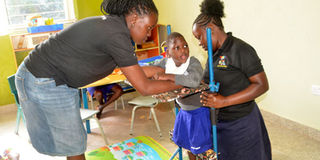Rosemary Nambooze raises awareness about Down Syndrome as world commemorates day

A child is assisted by health workers during a physical therapy session at Angel's center in Wakiso district, central Uganda, March 17, 2021. Angel's center was founded by Rose Nambooze, the mother of a child with Down syndrome. Staff members of the center take care of 100 children with Down syndrome, cerebral palsy, hydrocephalus and autism. (Photo by Nicholas Kajoba/Xinhua)
What you need to know:
Rosemary Nambooze, 39, after going through the challenges of raising a child suffering from Down syndrome for over 10 years, decided to open up her home to children in her community who are facing the disability
As the world commemorated the World Down Syndrome Day on March 21, a woman in the suburbs of the Ugandan capital Kampala is raising awareness about the genetic malformation in her community.
Rosemary Nambooze, 39, after going through the challenges of raising a child suffering from Down syndrome for over 10 years, decided to open up her home to children in her community who are facing the disability. "My son was born with a heart-related condition. We had to visit hospitals constantly and adjusting to these challenges made me actually become aware of the deficiency of such services here," Nambooze told Xinhua in a recent interview.
Down syndrome is a naturally occurring chromosomal arrangement. It usually causes varying degrees of intellectual and physical disability and associated medical issues. The World Down Syndrome Day is a global awareness day which has been officially observed by the United Nations since 2012. According to the Uganda Down Syndrome Association (UDSA), accurate figure on the prevalence of the malformation is not available although the number of babies born with the disability is estimated at about 1 in 1,000 births. With Uganda's population of about 45 million people, this translates to about 45,000 people with the disability.
Experts say obtaining data on the prevalence of Down syndrome in Uganda is challenging because some health workers have not been formally trained to identify the disability. The other factor is due to sociocultural factors where communities associate children with the disability being a bad omen. Taking a step at a time, Nambooze opened up Angel's Center for Children with Special Needs in her shanty house in Nansana Municipality. She started with four children aged between one year and 12 years.
After the number became overwhelming, she moved the child center to a more spacious place that accommodated over 160 children. At the center, the children undergo physical therapy sessions, which include speech and mobility training, games and writing. "We accommodate some of the children here, but others are taken by their parents and report back on a weekly basis. We also limited the number of enrollment because we needed a small number that would be accommodative," Nambooze said.
When the COVID-19 pandemic broke out in the country a year ago, it hit her hard as all schools were closed under stringent lockdown measures that aimed at halting the spread of the pandemic."We used to get many volunteers and funders who used to come and help us out for various programs, but COVID-19 pandemic caused many of them to halt their journey," she said. She said besides the effects of the pandemic, the center faces a challenge of lack of professional instructors. She said the children need a lot of attention and patience, especially during the learning session.
Despite the challenges, Nambooze is determined to push on in her efforts to raise awareness about the Down syndrome in her community.She plans to scale up community-based psycho-social support in her community. "We need to go to the communities around and offer counseling services to parents who have children with Down syndrome. Some of them hide them under beds so that the society out there does not see them for fear of segregating them," Nambooze said.She said she has a vision to integrate children with special needs into the community after acquiring practical skills so that they fully realize and utilize their potential in society."We want to be a voice and break the silence of disability in communities through increasing access to information and service delivery," she said, noting that there is need to give disability a "human face". "These children remain beautiful, lovely and important to the social network of society," Nambooze said.
Michael Okiro, head of UDSA said the country continues to network and strengthen collaborations with partners worldwide to help in raising awareness of Down syndrome. Okiro said through this collaboration many children with Down syndrome have had heart surgeries."Throughout the year we have managed to get funders for heart surgeries for over 20 children," he said.





